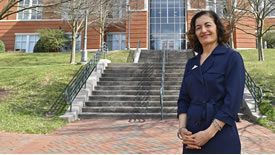CCI dean co-chairs international conference

College of Computing and Informatics Dean Fatma Mili was in North Africa recently, where she served as co-chair of Noor 2019, a conference focused on higher education during a time of dramatic transition in her home country, Tunisia.
Since its 2011 revolution, Tunisia has struggled. Its higher education and research system, which could be a stabilizing agent of change, has structural challenges that must be addressed. A diminished economy has resulted in fewer jobs for recent college graduates, which lowers the motivation of students and faculty alike. As such, students are leaving the country to study abroad or abandoning education altogether. Also suffering is the number of funded research projects, which limits opportunities for students and faculty to participate and impedes the kind of innovation that can resuscitate a fledgling economy. In short, Tunisian industry and education are trapped in a shared cycle that must be broken.
According to Mili, “The goal of the Noor Higher Education Conference was to bring together stakeholders (students, recent graduates, employers, institutional managers, project managers, ministerial officials, civil society agents, academic staff) involved in higher education to discuss and formulate expectations and outline concrete and innovative solutions.”
Tunisia’s higher education and research system is in a position to drive innovation and renewal by stimulating entrepreneurship, which could jumpstart the country’s economic development, expectations and opportunities. Beyond industry and the economy, a strong system of higher education can spur social change, civil awareness and ethics by graduating educated, enlightened future leaders.
Each country brings unique context and circumstance to the question of where education belongs in directing and determining the future, and Mili is always surprised by the universality of concerns and wishes.
“One of the findings elicited this year was the level of divergence between students’ aspirations as expressed by them and their aspirations as seen by faculty and employers,” Mili stated. “Whereas students expressed the desire to make a difference, to take risks and contribute to the development of their country, employers expected that the main aspiration of the students would be around stability and a good salary.”
With a population of more than 250,000 students and 23,000 faculty to satisfy, Tunisia’s higher education and research system impressed Mili, especially the solutions and reforms embraced by what is a very young system.
“In the last two years, funding for research increased by 51 percent with the added exclusive focus on research projects that add value and address current societal and environmental problems,” said Mili. “They also set up a network of conflict resolution centers to develop students’ capacity as leaders.”